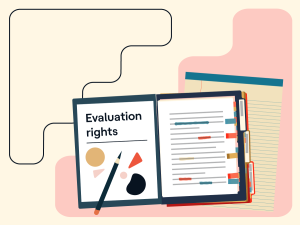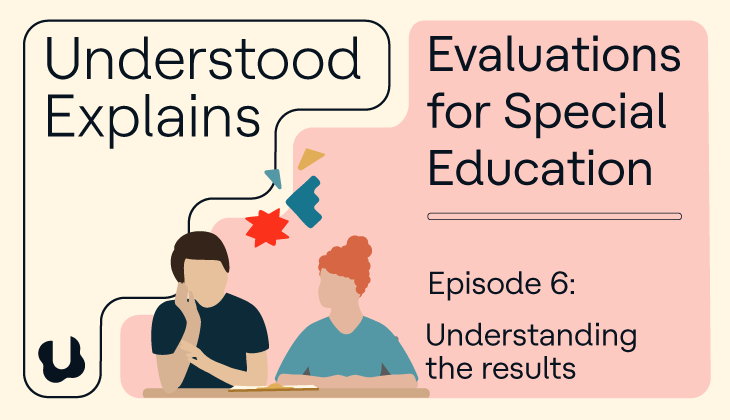Stay in the know
All our latest podcasts delivered right to your inbox.
The first time you look at your child’s evaluation report, you might be overwhelmed. What do all of those numbers mean? And are some numbers more important than others? This episode of Understood Explains will help you make sense of the results.
Host Dr. Andy Kahn is a psychologist who has spent nearly 20 years evaluating kids for public and private schools. His first guest on this episode is Dr. Ellen Braaten. She is an associate professor of psychology at Harvard Medical School and co-wrote Straight Talk About Psychological Testing for Kids. Andy and Ellen will explain:
What evaluation results look like
Key terms that can help you understand the findings
What to do if you think your child needs more testing
Andy’s second guest is parenting expert Amanda Morin, who has tips on how to share the evaluation findings with your child.
Related resources
Episode transcript
Michele: My name is Michele and I live in the Bronx, New York. My middle child — Lamont is my middle child — his diagnosis at first was a learning disability. I pressed very hard to find out OK, exactly what is his learning disability? And I was told that I needed to find that out on my own. My answer to that was, that sounds great, but you determined him to be learning disabled. So how can you place him properly in the proper educational setting if you don't know what his disability is? Is he dyslexic? Is he autistic? And I was told that I still needed to determine that on my own.
Andy: From the Understood Podcast Network, this is "Understood Explains." You're listening to Season 1, where we explain evaluations for special education. Over 10 episodes, we cover the ins and outs of the process that school districts use to evaluate children for special education services. My name is Andy Kahn, and I'm a licensed psychologist, and an in-house expert at Understood.org. I've spent nearly 20 years evaluating kids for both public and private schools. I'll be your host.
Today's episode focuses on understanding the results of your child's evaluation. We're going to explain three key things: what evaluation results look like, key terms that can help you understand what the results mean, and what to do if you think your child needs more testing. We're also going to give you some ideas on what you can say to your child about the evaluation results — and what not to say. First, let's hear another parent's story.
Jaime: Hi, I'm Jaime. I live in Pennsylvania and I have an 11-year-old son. They did not send us a written report about the evaluation findings. We did not find out what those were until we were in the IEP meeting. The way they present the results is like trying to read hieroglyphics. They're on all sorts of graphs and charts and they have like averages and stanines. And you know, they did their best to explain it to me, but I feel like you need a whole nother degree to really understand.
Andy: So it's very common for families to have trouble understanding their child's evaluation results. This is often true no matter whether the evaluation was done through their school district or at a private clinic. Entire books have been written to help parents understand these kinds of evaluation results. My first guest today has written one of those books. Dr. Ellen Braaten, co-author of "Straight Talk About Psychological Testing for Kids," is an associate professor of psychology at Harvard Medical School. She's also the executive director of the Learning and Emotional Assessment Program at Massachusetts General Hospital. She's also a mom of two and a longtime Understood expert. Ellen, thanks so much for being with us today. It's great to have you.
Ellen: Oh, it's so great to be here.
Andy: So I'll play a little fanboy here for a second, I've got to tell you, I've regularly referenced your book on psychological report writing sitting right over there on my desk — and recently re-read your "Straight Talk" book. And it's really remarkable. You've written some great advice for parents. And after nearly 20 years, this book has still really held up well, in terms of the advice piece. So what do evaluation reports typically look like? What do you see in good eval reports?
Ellen: Well, it can vary a lot. And that can be very confusing for parents, because some parents may get an evaluation done through a school, where oftentimes more than one person is doing an evaluation. And those reports can vary from just a page or two to 10 or 12 pages each. Or if they get an evaluation through a private evaluator, oftentimes, those reports will be pretty lengthy. And so I would say, you know, to answer your question about what should be in report, the number one thing I think parents should think about is the report that they read should be understandable. And it might not be. And then they need to ask questions. And two, it should capture their child. It should sound like their kid. And so when they read it, they should say, "Oh, wow, now I understand why my son does this this particular way." And so that's really what they should be looking for.
What they get is oftentimes lots of paragraphs, lots of charts, lots of numbers that they don't quite understand. And in some ways, that's OK. They don't you know, parents don't really need to understand every single thing in a report. They just need to understand how those numbers relate to their child and what to do about it.
Andy: Yeah, and I think one of the pieces of that that probably is helpful for parents to think about is the idea that some of the numbers and graphs and charts that are in there are required to justify some sort of finding. So if we're really trying to talk about this finding is proven by these and those numbers, I think that's awfully helpful.
Ellen: Exactly. And I think we should look at those reports in some ways as being more like a medical record than a report card. And parents sometimes like to go through the numbers and look at every single one. They should expect that there's a real range of numbers. These tests are designed to show highs and lows in everyone. So everyone is going to show strengths, everyone is going to have weaknesses, that's the whole point of it. So don't get nervous by some of the low numbers. Know that they're meaningful, but they're not necessarily worrisome.
Andy: So probably some good advice would be to tell parents, when you sit down to this, expect a little confusion, take a deep breath. And there are going to be things that you're not going to know right out of the gates.
Ellen: Exactly. And you know, I've worked with some families and kids over the years, and then parents get very good at this, after they've seen their third or fourth round of testing. But they weren't at first. And that's OK. I mean, this is a learning experience for you as a parent, too. And taking a deep breath and knowing that, OK, this is in there, it's kind of like reading your medical record, you don't need to know every single thing, every single number that's in your medical record. What you need to know is why it's meaningful and then where do we go from here.
Andy: And I think that making something understandable calls into play some questions around jargon. So maybe we can go through some of these really basic terms here, that would be extremely confusing to families. But maybe you can talk to me a little bit about those.
Ellen: Well, so one term I would start with is "percentile." It's a term that we use an awful lot when we are presenting test results. And percentile means where you fall in the normal curve. So when you think about that bell-shaped curve that most of us have seen one time or another, what we're talking about in percentile is where that skill falls relative to everybody else. So if you're at the 50th percentile, that sounds to parents like it's not so great, when in reality, it means you're right in the middle of the pack. And we think of the range of the 25th to the 75th percentile as being the average range. So that's jargon that you might hear like, even the term average, nobody wants to think their child's just average, but average really describes most of us. And we use that term percentile, meaning if I'm at this percentile, it means I'm better than that many people. So I'm at the fifth percentile, that means I'm better than five people out of 100 on that particular skill. If I'm at the 90th percentile, it means a better than 90 out of 100.
Another term that parents might hear a lot is "norm-referenced tests." That just means that the tests are normed or standardized on a particular group, and that their child is being compared to that group. So the group could be all girls between certain ages, it could be all fourth graders, all third graders, but it helps us get a sense of where a child's skill set is in a particular area.
And then they're going to hear things like "sub tests," which just means small tests, and things like "standard scores," or "scaled scores." It's just a way of describing data. And in a good report, the evaluators should have described what those are. It can depend on the test itself, but they're just really ways of saying we're using this as a measure of middle.
And the other thing too, that I think they should pay attention to are grade and age equivalents. Meaning that if there's a grade equivalent, it means that their child's performance is like the typical child in grade four. And sometimes it's even fourth grade second month. So all of these terms, really, they just boil down to, OK, where is the skill relative to a norm group or this child's peers.
Andy: Gotcha. Now, here, we get these evaluation reports. How often do you find that when you're working on a specific case that you're getting clear results, things that make sense to you?
Ellen: I like to think that this is a process — the testing, evaluation is really a process. It's not an event. So when you say how often does this all line up? Eventually it does. But it's not always right at first, meaning it takes a while, even after the evaluation for me personally to figure out what's going on. You know, sometimes I get a child who clearly meets criteria for dyslexia, I can see that — I don't even have to score the test and I can see. But most of the time, it is more complicated than that. And it takes some thinking. It takes some, oh, discussing with teachers again, or asking more questions of parents, sometimes even bringing the child in for additional testing as well.
Andy: So if we think about any of these findings, most commonly what I'm hearing is that kids may show certain challenges in varying amounts and degrees.
Ellen: Exactly. And even when we don't have very clear-cut ideas of what's going on, that in and of itself is informative, because that shows us that — sometimes when I'll say to parents, we have good news and bad news. The good news is we don't have a clear diagnosis. The bad news is we don't have a clear diagnosis. And that's going to mean that it's a little bit more complicated to figure out what to do, but also that there's less to worry about at the same time.
Andy: So when we think about the kind of things that we could give parents guidance towards, are there specific kind of questions you would advise parents to ask during this process to better understand the results?
Ellen: So one of the things they want to know is why are they seeking this evaluation. That helps the evaluator so much to have a really clear referral question, like "We are here because Billy is having trouble paying attention, and especially during reading." That's a really good reason for getting an evaluation. And then it's very clear. And it's important, too, and you have a voice as a parent, within the school system, in that you can request to have your input as part of that evaluation process. You can make sure that you have talked with the school psychologist, asked exactly what is going to be done, so that you have a better understanding of that. And if you're a parent who is receiving information, you're saying, "This does not fit for me whatsoever," that's reason to, you know — it's cause for concern in some ways, but more cause for more information and to dig a little bit further.
Andy: Can families reach out and talk to teachers and see if they agree with the conclusions? I mean, would you advise them to do that?
Ellen: I would, and I would advise you to get multiple opinions in any evaluation. And there are times when parents will say we really don't want the teacher involved for various reasons. But I always encourage it, because that communication, you know, is very important, because sometimes the parent does come in with one sort of thinking. They've been encouraged to come for an evaluation by the teacher who is seeing maybe attention problems at school, and the parent is not seeing it at home or doesn't want to see it because it's — you know, sometimes a parent themselves have struggled with attention and don't want to see their child go through the same sort of education that they went through. Many, many reasons for this.
But it's really important to show when you're a parent, you say like this didn't fit for me. Well, let's get the teacher in to talk about this. And let's see where, you know, where the middle ground is for this, always with the focus being on where do we go from here? And how do we help this child?
Andy: So Ellen, as we talk about these evaluation results, I think we're trying to make a decision sometimes about there's at least two ways to look at the evaluation outcomes. We have evaluation outcomes that can be clear in the moment and give us, you know, pretty good answers to the questions we've asked. And sometimes those are unclear in that moment of that assessment. What do we do when the outcomes are unclear? And considering the fact that maybe this is a school-based assessment, something that's happening during this 60-day period where the assessment has to occur?
Ellen: So if it's unclear, you should be asking lots of questions. And there are two things that could — two reasons why it could be unclear. One is that truly, there isn't a true diagnosis, there isn't a true, clear path forward. And then there's the other issue where someone hasn't pulled it together, and it can be pulled together. And you need to find out as a parent, whether or not the data just hasn't been pulled together for you, or whether or not this is really something that you need to sort of look at now and then wait and see. Most of the time, I find it's because someone hasn't been able to pull it all together.
So in a school-based evaluation, many people oftentimes do parts of the evaluation. The school psychologist will do the intellectual functioning. Maybe a teacher might do some of the academic testing. A speech and language might do the speech and language part, and so on. And so a parent can go to one of those meetings where they're discussing the evaluation and feel very confused, because everyone's given their little bit, but no one's pulled it together. And that's where you as a parent do have the right and the ability to ask for more clarification. And you can ask to meet again, whether it's with the school psychologist or a private evaluator to say "I'm not understanding this. I really need clarification."
And even if it's not clear, they should say, you know, there isn't something clear to worry about. But the other side is that we've got to sit with uncertainty and that's really hard. But we should be conscious of that uncertainty.
Andy: Well, let's grab some quick tips here. So when we're thinking about getting evaluation results for our first evaluation, are there any tips for parents in terms of their approach or their— how they're going to receive that or how they're going to sort of manage that? Because it's, I would imagine it's different for the first evaluation.
Ellen: I find that probably the biggest thing that parents should note is their own anxiety. And they're going to come into that room — and actually, I have to remember this as a psychologist myself with a parent who's getting an evaluation for the first time, that this is their child, who they, you know, love very, very much. And their greatest fears are perhaps coming into that office. And yeah, I think they have to know that they are there to get information. To be able to listen. Because there is sometimes a defensiveness when you are hearing results for the first time.
And know that you don't have to remember everything. I find it's very helpful to have more than one parent in the room. So if two parents can be there, or a parent and a grandparent, or a trusted friend who might be a teacher, for example, it can be really helpful. Because it's oftentimes a short appointment to get the results, and it can be a bit overwhelming.
Andy: So you've talked about the importance of asking questions so parents understand the result. Let's talk for a minute about what parents can do if they agree with the results, and what they can do if they disagree with the results.
Ellen: Well, so if you agree with the results, really the next step should be implementing those recommendations. That report is only pieces of paper if we don't then use what's in the report to change what's going on in the child's life.
If you don't agree with the evaluation, you are entitled to get a second opinion. And I would encourage parents who don't agree with the results to do that. I generally recommend, unless the child is really in a crisis, to wait a while before seeking that second evaluation. Because it can be a little bit muddy when you're trying to reevaluate a child very soon after, because the evaluator is not able to re-give those same tests again. So they're kind of stymied by what they're able to give. And also, the child has had exposure to the tests, so that might change the results a little bit. So unless the child is in crisis, and then it's a very different situation.
Andy: Gotcha. And I would imagine in the private setting, we have to be aware that there could be additional costs that could come with this. When we're trying to get clarification within the school systems, that remains a free evaluation process.
So Ellen, you mentioned that parents have a right to ask questions to help them understand what the evaluation results mean. And you mentioned parents have the right to ask for more testing, even to get a second opinion. But there's one more super-important right I want to make sure our listeners know about. And that's the right to see your child's evaluation report before you meet with the school. We talk more about this in Episode 7. But the quick version is that at the end of the evaluation process, there's a hugely important meeting where the team talks about the report and decides if your child's eligible for special education.
When I'm evaluating a child, I always tell parents that it can be very helpful to read the report in advance. You know, a lot of the details might not make sense when you're reading it on your own. But I think you should go ahead and look over the findings ahead of time, because this can give you a chance to start feeling whatever you're feeling. You may start to feel sad or surprised, maybe even relieved. But if you're seeing the report for the first time during the meeting, it can be really hard to set aside that flood of emotion or feelings. You know, you're in a room full of people and you're trying to keep it together and be part of the team. So listeners, reading the report in advance gives you the best chance to ask important questions and to advocate for your child during the meeting.
Now, different states have different rules about how far in advance schools need to give the report to families. For example, here in Maine, parents have the right to see the report at least three days before the meeting. And parents, you can cancel that meeting if the school hasn't sent the report within that time frame. Listeners, check out our show notes for more resources. And be sure to listen to Episode 3, which is all about your rights during the evaluation process.
Jennifer: Hi. My name is Jennifer and I live in Atlanta, Georgia. What happened when I went into that evaluation was that the psychologist who did the testing, she did the right tests, like she did good tests, but she didn't know how to interpret what she was seeing. So she told me, you know, there's one score that was really low. I'll never forget. And she said, well, I don't know why that one would be so low. That was really the only one he had that was below average. And it was reading one sentence with no context and he couldn't do it because he couldn't read, but he was really good at guessing if there was a paragraph. If there was any context, he could fake it. He could guess really well. And she's like, well, I can't explain why that one would be low.
Andy: So we've been talking about how to help parents and caregivers make sense of the evaluation results. But what can adults say to kids about the evaluation? My next guest is Amanda Morin. She co-hosts Understood's "In It" podcast about the joys and frustrations of parenting kids who learn and think differently. Hi, Amanda.
Amanda: Hi, Andy. It's good to be here with you. I'll also note that I'm a mom to kids who learn differently. I have three kids, two of whom learn differently.
Andy: Well, thanks so much for joining us again. I'd really love your advice on starting the conversation with kids about the results. How do we frame results in a positive way? I mean, just give me your initial thoughts about how we even start this discussion.
Amanda: This is the time where you really find out what it all means, right? And I think that's the first thing to say to your child is, "This is when we're going to look at this and figure out what this all means." And as a parent, you may not know what it all means. So you know, myself, even having been a classroom teacher, even being like trained in special education, one of the things I do is I always take out sticky notes, and like those sticky flags, and I put it in all of these evaluation reports I get when I have questions. So I think with older kids, you can do that with them too, is you can look through the report with them and like put a sticky note where they have a question.
For younger kids, that's a lot of information, right? So going through that entire report is really not the best use of your time with a younger kid. I do think the best use of your time with a younger child is to say, "Do you remember you did all those activities and you sat down with so and so in so and so, and somebody came in and watched in the classroom and saw what your classroom was like? Well, I have some information that came from that. And I want to share it with you."
And I think that that's a way to start that conversation, is "So what we learned from that…." And it might be what we learned from that is math is a little bit harder for you than reading. Or what we learned from that is that, you know what, you're just as smart as I thought you were. And here's where you have some trouble spots that we want to talk about.
Andy: That's great advice.
Amanda: I also think that there's a conversation to be had — and, Andy, I'm really curious about your thoughts on this one. So sometimes a report is going to come back with an identification or a diagnosis, right? So it's really — it's possible that you may have a report that says this child has a specific learning disability in reading, or a language-based learning disability. I'm not really sure whether it's the best thing to share that information with a kid up-front. Do you have thoughts on that one?
Andy: It truly depends. I think, for older kids, they may have more of a deep desire to understand some of the terminology, and to talk about some of the results on the page. And I think, within reason, I think those are valuable conversations if your child is pushing for that information. I think I'm really cautious. And I like to do it in parts with kids — to talk about here is, here are the things that I see based on this information. So if they have, you know, a specific learning disability that's on the page, this evaluation said that you really do struggle with these very specific skills, and these very specific activities. And I think that we're using that as the bridge that we're building to them getting supports.
I always couch my conversations about diagnosis, that a diagnosis in many situations is a way to get something else. A diagnosis is a piece of paper that can help us get you to see a counselor and get some support and our insurance will pay for it. And it's not a definition of you. It is just a definition of those things you experience are called something.
Amanda: I think it's really valuable. And I think it's really valuable in part because parents may not be there yet either. They may not be ready to talk about that diagnosis or that label. But it's about making sure that you say this is the way that we get help. It's about the laws. It's about how the law looks at this and it makes sure that we can get support.
Andy: So we've talked about what evaluation results look like, what to do if you agree or disagree with the results, and how you can talk to your child about this part of the evaluation process. If there's one thing you can take away from this discussion, it's that you can play a very active role in deciding what happens next. Don't be afraid to ask questions about what the results mean, and to request more testing if you think your child needs it. As always, remember that as a parent, you're the first and best expert on your child.
In our next episode, we'll explain what happens after the evaluation. This is where we'll explore what happens if your child qualifies for special education. Or if your child doesn't qualify, how 504 plans and informal supports can help. We hope you'll join us.
You've been listening to Season 1 of "Understood Explains," from the Understood Podcast Network. If you want to learn more about the topics we covered today, check out the show notes for this episode. We include more resources as well as links to anything we mentioned in the episode. And now, just as a reminder of who we're doing all this for, I'm gonna turn it over to Eliza and Susanna to read our credits. Take it away, you two.
Eliza and Susanna: "Understood Explains" is produced by Julie Rawe and Cody Nelson, who also did the sound design for the show. Briana Berry is our production director. Andrew Lee is our editorial lead. Our theme music was written by Justin D. Wright, who also mixes the show. For the Understood Podcast Network, Laura Key is our editorial director, Scott Cocchiere is our creative director, and Seth Melnick is our executive producer. A very special thanks to Amanda Morin and all the other parents and experts who helped us make this show. Thanks for listening and see you next time.
Andy: Understood is a nonprofit organization dedicated to helping people who learn and think differently discover their potential and thrive. Learn more at understood.org/mission.
Host

Andrew Kahn, PsyD
is a licensed psychologist who focuses on ADHD, learning differences, anxiety, autism spectrum disorder, behavior challenges, executive function, and emotional regulation.
Latest episodes

July 13, 2022
How do schools evaluate kids for special education? For a quick preview, listen to the trailer for Season 1 of the Understood Explains podcast.

July 13, 2022
Is your child struggling in school? Are you wondering what supports might help? Get an overview of how schools evaluate kids for special education.

July 13, 2022
How do schools and families decide if a child needs an evaluation? Get tips to help decide if now is the right time or if you should wait.

July 13, 2022
What rights do families have in a school evaluation? Learn how special education law protects your rights during the evaluation process.

July 13, 2022
School evaluations are free — and you can ask for one at any time and for any reason. But the details you include can make a big difference.

July 13, 2022
What happens during the evaluation? And what role do families play? Learn how to help shape the evaluation plan and help your child get ready.

July 13, 2022
The evaluation report is done. Now what? Learn about eligibility determination meetings and different kinds of supports for struggling students.

July 13, 2022
Why do some families pay for private evaluations when the ones at school are free? Find out in this episode of the Understood Explains podcast.

July 13, 2022
How often do kids need to be reevaluated? Find out what to do about losing IEP services and how reevaluations can help teens get ready for college.
